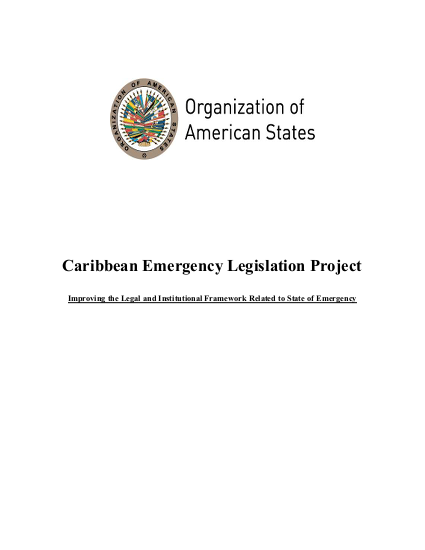
Over time, the Caribbean region has been faced with frequent occurrences of hurricanes, floods, landslides and volcanoes, which have repeatedly affected its fragile islands on a major scale. Conscious of the need to more strategically prepare for these disasters, the OAS-DSD has initiated this project to examine the existing legal, institutional and budgetary frameworks to improve responsiveness, to ensure the adequacy of resources in the event of these occurrences and to promote disaster loss reduction1 . Natural disasters produce an enormous impact on the environment and society. The problems brought about by these disasters cannot be solved easily, however, for even fully industrialized nations with long years of coping with earthquakes, floods, typhoons, volcanoes and other types of natural perils are still threatened by natural disaster risks2 . In small islands and coastal regions, ecosystems are small and closely linked, coastal zones are impacted by upper watershed activities and most resources are subjected to frequent—and often conflicting—exploitation. It is therefore essential to approach management from an integrated perspective. Small developing Caribbean countries have established several legislative and institutional structures to address particular aspects of disaster management, but their comprehensiveness and inadequacy in handling the oft-times crippling after-effects are a cause of urgent concern. This OAS-DSD/World Bank “Caribbean Emergency Legislation Project” (CELP) was formulated to respond to the lack of relevant state of emergency legislation and institutional framework capable of mobilizing executive powers in the aftermath of a disaster. The CELP aims to raise awareness among government decision-makers and provide recommendations to improve legislative channels and administrative procedures during and immediately after natural disasters. In conjunction with the ongoing disaster occurrences in the region, the recent earthquake in Haiti makes the need for reform in this area all the more critical. The project conducts a study to improve the legal and institutional frameworks for state of emergency and budget appropriation powers by proposing the implementation of a set of clear and transparent procedures. These state of emergency procedures are recommended for the twelve Caribbean countries participating in the project: Antigua and Barbuda, Barbados, Belize, Dominica, Dominican Republic, Grenada, Haiti, Jamaica, Saint Kitts and Nevis, Saint Lucia, Saint Vincent and the Grenadines, and Trinidad and Tobago. Of these countries, ten are common law jurisdictions, while the Dominican Republic and the Republic of Haiti are civil law jurisdictions.